Reviews
Stuart Millar
USA, 1975
Credits
Review by Adam Balz
Posted on 13 August 2009
Source Universal Studios DVD
Categories Women of the West
“Duke was miserable at that altitude and often made everyone else miserable. He couldn’t take a drink at night because he was on medication, and that made him cross. He couldn’t sleep, coughed constantly, needed oxygen, and was emotionally upset because of his breakup with his wife, Pilar. He took out his unhappiness on everyone.” — Martha Hyer Wallis, Finding My Way
In a 1975 article for The New Republic, film critic Stanley Kauffmann reviewed two new releases, both of them Westerns. The first was a near two-hour sequel to True Grit starring John Wayne and Katharine Hepburn, both of whom were 68 years old at the time. The second was Hearts of the West, a comedy starring fresh-faced twenty-something Jeff Bridges as an Iowa farm-boy who dreams of working on big-budget Hollywood Westerns; co-stars include Alan Arkin, Donald Pleasance, and Andy Griffith. And while Kauffmann dismisses both films equally for their reliance on “hokum,” he generally praised Rooster Cogburn for its support of a “home truth” concerning veteran performers and their relationship with the audience. Still, one year after Blazing Saddles and only four years before moviegoers would lose Wayne to cancer, it seemed as though there was increasingly less room for the traditional American Western.
There are a number of reasons why the genre began to evaporate, most of which are simple matters typified by Rooster Cogburn. The penultimate film of John Wayne’s career, Rooster Cogburn finds the titular one-eyed marshal being stripped of his badge after shooting too many of the men he is contracted to arrest. (In his defense, Cogburn reminds the judge that only a small handful of them actually died.) Given one final chance to recapture his honor, he must track down and detain the leader of a band of outlaws, a borderline sociopathic young man named Hawk, whose gang has seized a wagon of nitroglycerin with the intention of using it to confiscate a shipment of gold. In the process, they set up camp in a small settlement, where they face off against a Christian preacher and his daughter; the preacher is eventually killed in a late-night scuffle, along with an unknown total of Native Americans, and Cogburn arrives in the midst of a makeshift funeral. The preacher’s daughter, Eula Goodnight, and the son of one of the Native American victims, who is nicknamed Breed, join the marshal in his hunt, albeit against the old lawman’s wishes.
Unlike its predecessor True Grit, which was not only adapted for the screen by a female screenwriter but done so openly, Rooster Cogburn hides the identity of its writer — Martha Hyer, an Oscar-nominated actress — behind a gender-specific nom de plume, Martin Julien, which creates an uneasy dichotomy between the writer and her message. Hepburn’s character, Eula Goodnight, is a resilient, independent, and outspoken woman whose first encounter with Hawk ends in a pronounced victory: when she stands before his gang and asks that they refrain from giving the Native Americans alcohol, he drops a coin at her feet — a sarcastic offertory — before firing rounds into the dirt; she doesn’t budge, reciting the Lord’s Prayer as he empties his pistols around her without effect. Her triumph, however, is bittersweet, and over the course of the film she balances her Christian ways with a desire for revenge that never breaks her upright composure. For a Western, even one released in post-Nixon America, Eula Goodnight is a breaker of stereotypes.
Unfortunately, many other stereotypes are either left intact — the alcoholic Native American, for example — or are dealt with poorly. Cogburn’s seemingly heartfelt pledge that he will help Breed become the first “Indian marshal” is patently idealistic considering the social and cultural environments of 1880. Similarly, Goodnight herself, despite her surprising ease with handheld firearms and even a Gatling gun, does not arrive at the hero’s side with the most honorable of backgrounds. A Christian, she first appears to us framed by the door of a church; behind her, we hear a dozen sweet voices singing a beautiful hymn. As we soon discover, the voices belong to Native American children, and suddenly we are faced with the knowledge that Goodnight is a participant in that much practiced and deeply disgraceful custom of converting Native Americans into fluent, English-speaking Christians. She may live and pray alongside them, even rushing to protect them as Hawk and his gang pillage the settlement, but deep down she does not see them as equals.
Even the character of Cogburn seems changed. He still drinks, still favors loneliness, still lives in the back of Chen Lee’s shop alongside the owner’s orange cat, still has grit. Yet his gruff, stubborn exterior seems to have weakened in the years since True Grit, as though the transfer of screenwriters caused some of his personality to fall away. His cordial, almost fatherly relationship with Breed seems forced, included for no other reason than to appease politically correct viewers, though this relationship does little to make up for the young man’s name, and Cogburn’s insistence on referring to Goodnight as “little sister” becomes infuriating. When the film ends without Cogburn having changed, even after spending so much time with a teetotaling Christian determined to make him change his ways, we sigh in relief.
None of this, though, explains Martin Julien. Martha Hyer was a respected actress with nothing to lose in advertising her new pursuits, so her pseudonym is a mystery. An explanation has never been provided, not for its rationale or its etymology; even Hyer’s own memoir, published almost two decades ago, offers no reason for the pseudonym, writing only that producer Hal Wallis had “great difficulty getting a shootable script. He knew what he wanted, so he and I wrote the first draft of the screenplay. Then Duke and Kate rewrote parts of it, and later Charles Portis — author of True Grit and originator of the Cogburn character — put a polish on it.”
Perhaps Martin Julien was meant to be an attempt at selflessness, a gracious move to give credit to all by giving sole credit to none. Or Martin Julien may have been an attempt at staving off claims of preferential treatment — assertions that Hyer gained her job because of her marriage to producer Hal B. Wallis rather than because of her skills, which would be outright absurdity considering how well the film is written, especially the exchanges between Cogburn and Goodnight that are allowed to unfurl wonderfully between gunfights. [Footnote: I would be remiss if I didn’t mention the fact that, unlike most Hollywood memoirs, Martha Hyer’s autobiography was penned without the help of a ghost writer and is exquisitely written — proof positive that Hyer was a gifted wordsmith in her own right.] Criticisms that Rooster Cogburn is nothing more than The African Queen lifted and dropped into the American West are based on nothing more than Hepburn’s presence and the fact that the film’s climax involves a river and raft; Rooster Cogburn is an appropriately unfussy motion picture that suffers overwhelmingly from its place in time.
A lot changed in the six years separating True Grit and Rooster Cogburn. The United States fell deeper into Vietnam and the presidency changed hands because of a massive scandal; the Feminist movement gained further traction throughout the country; and the American Indians Movement staged protests against unfair treatment, culminating in their occupation of Alcatraz Island, all of which helped render the he-man American stand-ins nothing more than ridiculous glimpses of nostalgia and long-lost ideals. Furthermore, there was the American Space Program. What cowboy or federal marshal could stand up to an astronaut in the minds of American children? Who wanted to idealize an old figure based on violence, vice, and prejudice when they could venerate someone who broke through the atmospheres of earth and touched the surface of the moon, someone who stood for unity and peace on this tiny marble of ours? John Wayne was worn down and dying, but Neil Armstrong, Buzz Aldrin, and Michael Collins were all decades younger and in excellent health. They were the new cowboys, the new marshals, the new heroes, and not even Katharine Hepburn could change that.
More Women of the West
-
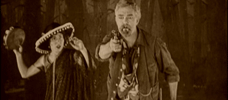
49-17
1917 -

The Gun Woman
1918 -
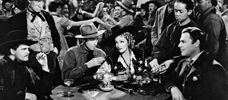
Destry Rides Again
1939 -
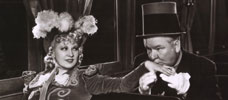
My Little Chickadee
1940 -
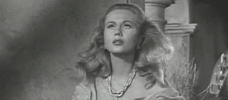
Colorado Territory
1949 -
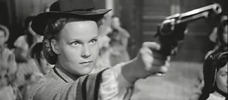
Westward the Women
1951 -
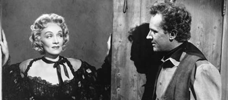
Rancho Notorious
1952 -

The Violent Men
1955 -
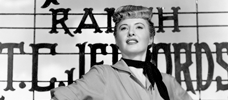
The Furies
1950 -

The Last Sunset
1961 -
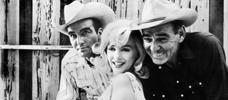
The Misfits
1961 -
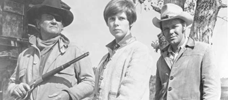
True Grit
1969 -

Hannie Caulder
1971 -
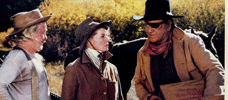
Rooster Cogburn
1975 -

McCabe & Mrs. Miller
1971 -
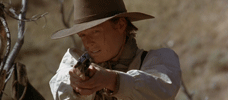
The Ballad of Little Jo
1993 -

The Quick and the Dead
1995 -

Viva Maria!
1965 -
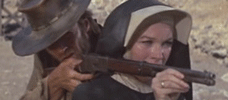
Two Mules for Sister Sara
1970
We don’t do comments anymore, but you may contact us here or find us on Twitter or Facebook.



